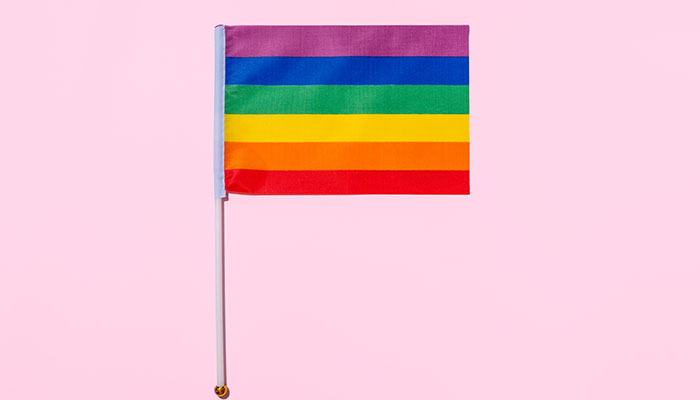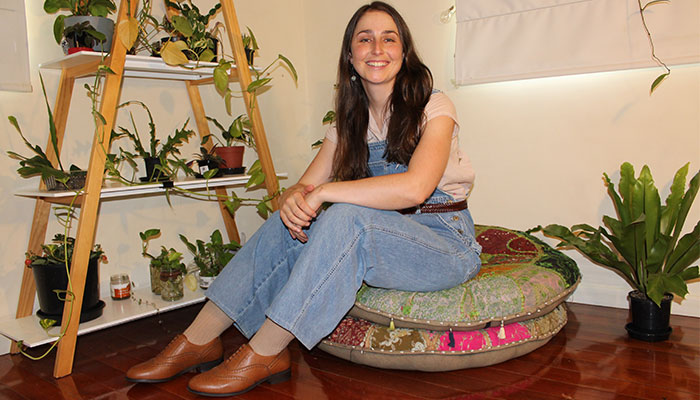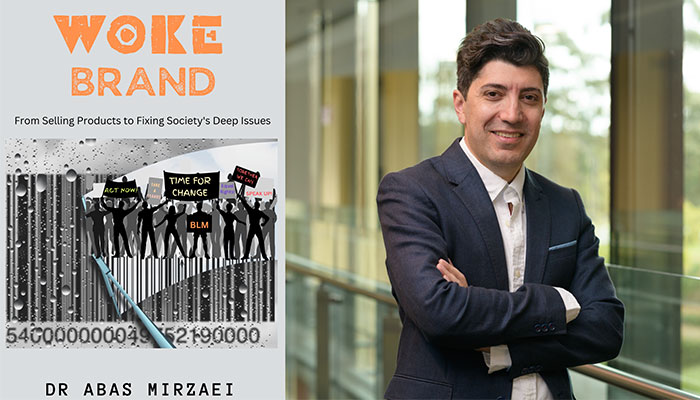Trying to be woke can be a double-edged sword for any brand. Being seen to take a stand on social justice issues, such as racism, diversity and inclusion or measures that minimise environmental impact, can increase customer loyalty. But if people aren't convinced a company's new-found awareness is genuine, it can lead to a backlash and boycotts.
Authentic action: Dr Abas Mirzaei, pictured, argues in his new book that consumers holding brands accountable for their involvement in social issues is a positive force for societal change.
Woke Brand, a new book by Dr Abas Mirzaei, a Senior Lecturer in Marketing at Macquarie Business School, explains what the term means in a corporate environment and how brands can navigate an authentic path towards contributing to the social good rather than focusing solely on profit.
"It's about brands being alert to injustice and trying to do something about it in an authentic way," he says. "Customers want to see that you're not just opportunistic but doing something concrete. Brand managers need to do their research, create a vision and then muster the courage to act."
Corporate woke-signalling reached a peak in 2020 in the wake of the Black Lives Matter and #MeToo movements, Mirzaei says.
Global brands such as Nike, Uber, Mars, and Ben & Jerry's — as well as Australian brands such as THE ICONIC, Cotton On, Aesop and others — used social media and advertising campaigns to declare their support for these movements.
The word 'woke' originates from the 1940s when African Americans campaigners used it to refer to awareness of racism and discrimination.
Rainbow-washing
In February, during Sydney World Pride month, many brands declared their support for diversity and inclusion by using rainbows in their marketing to show solidarity.
But Mirzaei warns that consumers are sceptical of claims that are not supported by tangible actions or meaningful change. They accuse companies of 'rainbow-washing' (superficially referring to LGBTIQA issues) or 'green-washing' (referring to the environment) or simply 'woke-washing'.

All talk? Many companies showed their support for diversity and inclusion during Sydney World Pride month using rainbow logos however Mirzaei says a growing chorus of customers wants to see real action rather than gestures.
"Real action encourages people to trust brands more," says Mirzaei.
"It means a company improving the diversity of its own workforce, creating products targeted at a diverse audience (such as unisex clothing or shoes for disabled people) or using plus-size or trans models for example."
Mirzaei used data mining techniques to analyse social media posts on Facebook, Twitter, Instagram and YouTube. He looked at posts by companies about their social justice positions and initiatives and the reactions they received from social media users - both complimentary and supportive as well as critical and damning.
Facing the risks
Based on the findings of this research, Mirzaei says that to be successfully woke, brands must have well-planned positions on social justice issues and be prepared to continue, even if they face attacks by woke critics or suffer a financial impact.
"Otherwise, a random one-off woke move, with an attacking and divisive tone, can only lead to woke-shaming and greater divide, and potentially, resistance from opposers," he says.
He refers to Adidas' decision to cancel their Yeezy line of running shoes after Ye (formerly known as Kanye West) made racist and anti-semitic comments at Paris Fashion Week in October 2022.
"Even though it took the brand a while to respond, Adidas risked losing US$750 million for unsold Yeezy shoes but it also showed customers what Adidas brand values really are.
"Their response risked hurting their revenue, but it sent a powerful message that anti-semitism and bigotry have no place in society. When some courageous brands lead, others follow," he said. Footlocker, Gap and Vogue also severed ties with Ye.
Mirzaei advises brands to practise what they promise and make sure the action they take aligns with their products. A good example is AirBnB helping provide emergency accommodation around the world to 100,000 refugees from Ukraine.
Brands such as Gillette, Mars (M & M's) and Uber have tried woke ad campaigns that fell flat when they weren't linked with substantial action, he says.
Customers between the ages of 16 and 50 years-old are the target group who expect progressive brands to be agents of change and promote high social values.
"Many of these young people are informed consumers," Mirzaei says.
"My book argues that these consumers holding brands accountable for their involvement in social issues is a good thing - that it will contribute to societal change."
Jasmine: A conscious consumer
Studying for a Master's degree in Conservation Biology, 26 year-old Jasmine Hall is particularly aware of the environmental and social impact of modern consumerism. She buys from brands that act on their social justice claims, especially when it comes to fashion which accounts for 10 per cent of global carbon emissions.

Mindful buying: Jasmine Hall, pictured, wearing shoes made from recycled materials, aims to spend her money with brands that demonstrate sustainability and social justice action. Image credit: Ben Duffus.
"Not everyone has the privilege to buy ethically," she says. "Some people can only afford to buy what is cheapest and easiest. But it's very important for me and many of my friends to buy quality rather than quantity, and buy from brands that align with our values."
Jasmine recently bought shoes online using the Good On You app as a guide. The app rates the ethical actions of global fashion brands. The store she chose received a good rating because it makes products from eco-friendly and recycled materials, manufactures locally and are certified carbon neutral.
"I feel good about buying these shoes based on the company's actions," she says.
Jasmine's previous purchases include a swimsuit from a company that uses recycled plastic bottles to make the fabric, and a body roller from a brand that uses natural latex and sustainably-harvested mango wood instead of foam.
"When people ask me where I buy things, it starts a conversation about ethical issues and they want to support these companies too," says Jasmine.
"They value a special connection with a brand that acts ethically."
Woke Brand - From Selling Products to Fixing Society's Deep Issues by is availble on Amazon.
Dr Abas Mirzaei is a Senior Lecturer in the Department of Marketing at Macquarie Business School







